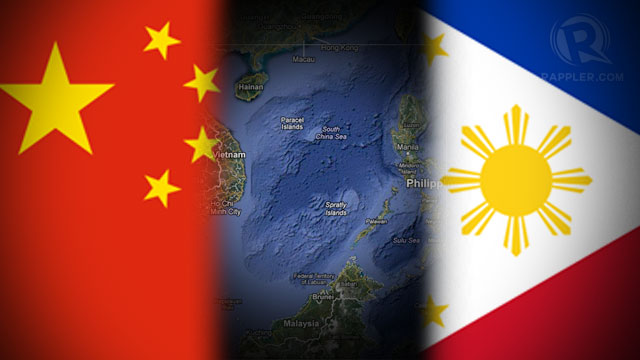SUMMARY
This is AI generated summarization, which may have errors. For context, always refer to the full article.

MANILA, Philippines – As United States President Barack Obama embarked on an Asian trip that includes the Philippines, a senior Chinese diplomat pressed for the bilateral resolution of disputes in the West Philippine Sea (South China Sea).
Liu Zhenmin, China’s senior official for China-Asean affairs and Vice Minister of Foreign Affairs, said this should be done in the spirit of “peace and cooperation,” without the involvement of “external” parties.
Liu made the call in his article, “Promote cooperation, manage differences in the spirit of ‘He.’” It was distributed by the Chinese Embassy in Manila to the Philippine media on Wednesday, April 23.
The article was first published in Thai newspaper, the Nation, on Tuesday, the eve of Obama’s Asian tour, which began in Japan and ends next week in the Philippines. Both are countries locked in a territorial dispute with China.
Liu said that disputes in the South China Sea should be resolved in the spirit of “He” – Chinese for peace and cooperation.
“‘He’ implies peaceful, harmonious and auspicious; it can also refer to cooperation, integration and combination. This cultural DNA affects the behavior pattern of the Chinese people as well as the way China handles its relations with its neighbors,” Liu said.
Sea of ‘friendship and cooperation’
The Chinese official prescribed ways that China believes will help make the South China Sea “a sea of peace, friendship and cooperation” – first, through cooperation based on “mutual respect and accommodation.”
“Even in the old days, China chose to perceive its neighbors in an amicable and accommodative light and develop relations with them by sending out merchant ships rather than gunboats. China never imposes its practice or opinions on other countries; even less does it attempt to grab the interests of other countries by use or threat of force,” Liu said.
The statement contradicts repeated claims by the Philippine government of continued harassment of Philippine civilian boats by Chinese ships in areas claimed by both countries; in some instances, in places that are not disputed such as the Recto Bank (Reed Bank) off the coast of Palawan.
The second, Liu said, is that “engaging and treating each other candidly is the key to proper settlement of our differences.”
“We advocate the spirit of ‘He’ not as a means to dodge disputes and differences. We believe the important thing is to understand each other better through direct communication and move forward step by step to find a proper solution on the basis of mutual understanding,” he said.
Liu reiterated the position of China that parties locked in territorial dispute should settle their differences on a country-to-country basis, and not through a third party – apparently referring to the strategy taken by the Philippines, which has raised its case against China to an international arbitral court.
“If anyone should rather recklessly stick to its own way of doing things, reject dialogue and communication or even try to bring external players into the picture, it is not only unhelpful but also likely to escalate tensions and undermine peace and cooperation between countries concerned,” Liu said.
He also said that “mutual benefit and harmonious development is the shared goal of our cooperation.”
“History has shown that no nation can advance by shutting itself off from the outside world. Cooperation is not about who eats up whom or who follows whom. It is about seeing the bigger picture and the long-term interests instead of just one’s own immediate interests,” he said.
He said cooperation between China and the ASEAN “made regional economic growth and prosperity possible” when the Asian financial crisis struck in 1997, and again in 2008.
“I am convinced that as long as we are committed to peace, cooperation and mutual benefit, we will overcome difficulties, intensify our cooperation and make the South China Sea a sea of peace, friendship and cooperation and this region a beautiful home shared by us all,” Liu said.
‘Achievements’ in Asean-China relations
The Chinese official also sought to highlight what he called “remarkable achievements” in China’s relations with the ASEAN, even with unresolved territorial disputes with some of its member-nations.
He said that China was the first ASEAN dialogue partner to sign the Treaty of Amity and Cooperation in Southeast Asia in 2003, and forged a free trade agreement with the regional grouping in 2010.
“On visits to ASEAN countries, the Chinese leadership proposed building a closer community and shared destiny with ASEAN and a 2+7 cooperation framework focusing on the political, economic, financial, connectivity, maritime, security and people-to-people spheres,” Liu said.
He also said that China signed with the ASEAN the Declaration on the Conduct of Parties in the South China Sea (DOC) in 2002, which remains a non-binding instrument 11 years after it was forged due to China’s insistence on the bilateral resolution of territorial disputes.
“Generally speaking, despite the existing disputes, the overall situation in the South China Sea has been stable, allowing freedom of navigation that has helped it become one of the most economically dynamic regions in the world. Drawing on the spirit of ‘He’ will aid China-Asean cooperation and enable us to handle disputes properly,” Liu said.
Chinese officials in Manila have been asking the Philippines to abandon its arbitration case and instead resolve the dispute on a bilateral level, but the Philippines remains steadfast in its position to settle the matter under the United Nations Convention on the Law of the Sea (UNCLOS). – Rappler.com
Add a comment
How does this make you feel?
There are no comments yet. Add your comment to start the conversation.